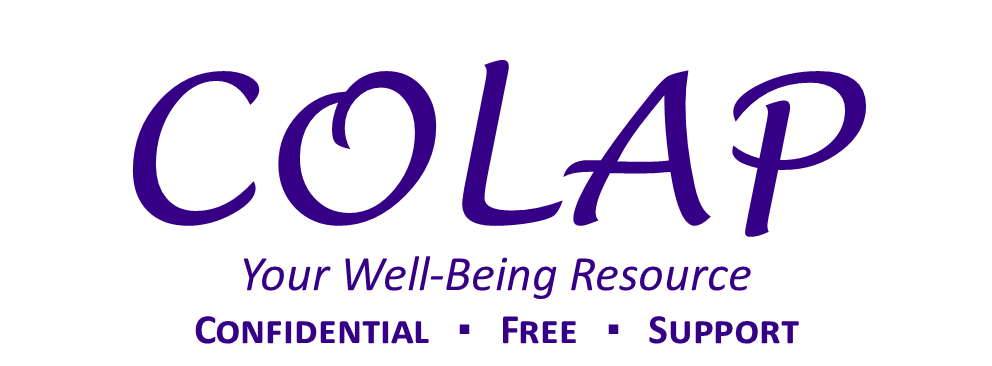Improving Your Personal Relationships

Colorado Lawyer Assistance Program
2490 West 26th Avenue
Denver, CO 80211
303-986-3345
www.coloradolap.org
“Falling in love and having a relationship are two different things.” ~Keanu Reeves
The qualities that make great judges/magistrates “great” often start before law school, but are reinforced and perfected during the study of the law, the practice of law, and with years on the bench. These include knowing how to: argue effectively, crossexamine, focus on all the details, delay, outwit, and avoid showing weakness. But, as Dr. Fionna Travis points out in her article, Marry a Lawyer? Proceed with Caution, these very qualities are contraindicated for personal relationships. The practice of law, and being a judge/magistrate, often requires attributes such as ambition, narcissism, skepticism, defensiveness, perfectionism, and the need to be in control. Cultivating and maintaining healthy personal relationships, however, requires humility, forgiveness, humor, warmth, vulnerability, and open communication.
How can judges and magistrates be successful in their careers and also successful in their personal lives? It is a tricky balance. Contrary to Pat Benatar’s anthem, love is NOT a battlefield. The first step is for judges and magistrates to separate professional relationships from personal relationships. Most of you started your legal careers as attorneys and, as such, you put on a problem solving, argumentative, and adversarial hat. As neutral judges and magistrates, you might not wear those hats as much, but you are still exposed to them on a daily basis, in addition to putting on an authoritarian hat. After all, you are the only one in charge of your courtroom. When you are with your loved ones, however, a slightly different hat is needed. Personal relationships are not meant to be adversarial, but rather collegial, understanding, and compassionate. Don’t focus on winning the argument or figuring out the quickest way to solve the problem. Be open to discussion, particularly listening to and understanding your loved one’s point of view. Agree to disagree. Be honest and vulnerable. Ask for help when you need it. Understand the difference between quality time and quantity time. When you are with your spouse, partner, family, or friends, it’s not about how much time you are spending with them; it’s about being present and open with them.
Being a judge or magistrate is a very demanding, often stressful, profession. It is important to know and communicate openly with your loved ones about how you can work together to prevent that stress from negatively impacting your personal relationships. Do your friends and family know what it is like for you to be a judge/magistrate? Within reason, it might help to let your loved ones know how a typical day impacts you emotionally and mentally; and how they can support you. Alternately, it is crucial that you truly listen to your loved ones and learn how you can be supportive of them. Your stress isn’t more important than their stress, even though the magnitude of what you deal with on a daily basis can, at times, seem so.
Another way to improve your various relationships is to examine the level of “drama” that is occurring within them. The legal profession can be loaded with highstakes, dramatic situations. Your relationships with friends, family, and loved ones should not mirror this conflict. In her article Drama and Chaos in Relationships, Dr. Linda Hatch explains that tension, chaos, and drama in relationships can be a symptom of avoiding intimacy and boredom. The adrenaline that we produce during arguments or hostile situations can be addictive and when life becomes calm, we crave that adrenaline. Hence dramatic situations can be created and repeatedly played out in our relationships especially after long stressful work days.
There are many reasons you should take the time to focus on your personal relationships. One main reason is that the condition of your personal relationships has an impact on your health and overall wellbeing. Another is that your personal relationships do affect your professional life. When your personal relationships are suffering you could lose focus, miss deadlines, and often become irritable with litigants, your staff, and attorneys in your courtroom. As your professional life suffers, you could then take it out on your personal relationships, and the cycle continues. Save yourself and your loved ones from this stress!
Click below to read more about balancing your work and your personal life:
http://www.psychologytoday.com/blog/in-practice/201301/50-characteristics-healthyrelationships
http://www.campbell.edu/pdf/counseling-services/characteristics-of-healthy-romanticrelationships.pdf
By Sarah Myers, JD, LMFT, LAC Executive Director, Colorado Lawyer Assistance Program © Colorado Lawyer Assistance Program, 2020
The Colorado Lawyer Assistance Program (COLAP), your free, confidential and independent well-being program for Colorado judicial officers, is available at www.coloradolap.org or by calling 303-986-3345. If you or a colleague are in need of confidential support, referrals, direction on how to resolve personal or professional stressors, or are interested in a free well-being consultation, please contact COLAP directly for assistance.